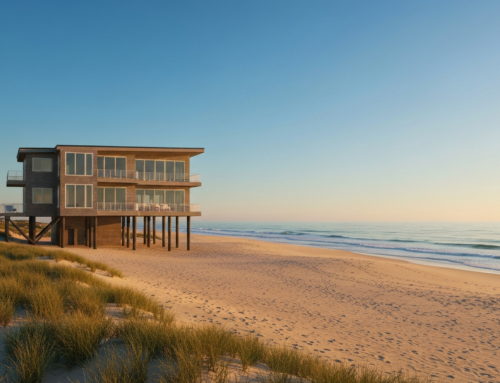The Unpredictable Waters: Why Flood Insurance Matters in South Carolina
In a state as beautiful and diverse as South Carolina, the threat of flooding is a constant concern for homeowners. From its extensive coastline to its intricate network of inland rivers and low-lying areas, the Palmetto State is highly susceptible to flood events. For this reason, understanding flood insurance in South Carolina is not merely a recommendation but a critical necessity for protecting your most valuable asset. Flooding is consistently ranked as the most frequent and costly natural disaster in the U.S., according to the Federal Emergency Management Agency (FEMA). Many residents incorrectly assume they are safe from flood risk; however, a significant portion of flood claims originate from areas outside of designated high-risk flood zones.
Recent events, such as the 2024 Edisto River flood that led to dam failures and substantial damages, underscore the pervasive nature of this risk, affecting communities from the coast to the mountains. Despite this, a relatively low percentage of South Carolina homeowners carry flood insurance, leaving many vulnerable to devastating financial losses. Even a modest amount of water, as little as one inch, can cause tens of thousands of dollars in damage, highlighting the importance of proper protection.
Understanding Flood Insurance in South Carolina: What Every Homeowner Needs to Know
Flood insurance is a specialized policy designed to cover direct physical losses to your property and belongings caused by flooding. Unlike other forms of water damage that may be covered by standard homeowners insurance, flood insurance specifically addresses the “overflow of inland or tidal waters, unusual and rapid accumulation or runoff of surface waters from any source, or mudflow.” This distinction is crucial for homeowners across South Carolina, as understanding what constitutes a flood for insurance purposes can prevent unexpected financial burdens.
When securing a flood insurance policy, coverage typically extends to two main areas:
- Building Coverage: This protects the physical structure of your home, including its foundation, electrical and plumbing systems, built-in appliances, and detached garages.
- Contents Coverage: This covers your personal possessions within your home, such as furniture, clothing, electronics, and other valuables.
It’s important to note that these coverages often have separate limits and deductibles, allowing homeowners to tailor their protection based on their specific needs and property value.
Why Your Standard Homeowners Policy Won’t Cover Flood Damage
One of the most critical facts for any South Carolina homeowner to grasp is that a standard homeowners insurance policy explicitly excludes damage caused by flooding. This distinction is a cornerstone of property insurance, separating perils covered by a basic policy (like fire, theft, or wind damage) from those requiring specialized coverage.
For instance, if heavy rain causes water to enter your home through a damaged roof or window, your homeowners policy might cover the resulting damage. However, if that same heavy rain causes a nearby river to overflow its banks, inundating your home with floodwaters, the damage would *not* be covered by your standard policy. This fundamental exclusion makes a separate flood insurance policy indispensable for comprehensive protection against South Carolina’s varied and increasing flood risks.
Navigating the National Flood Insurance Program (NFIP) in SC
For most homeowners, the National Flood Insurance Program (NFIP), managed by FEMA, is the primary source of flood insurance. The NFIP operates in partnership with private insurance companies and is available to anyone living in one of the 22,600 participating communities nationwide, including many across South Carolina. For properties located in high-risk flood areas (Special Flood Hazard Areas or SFHAs) with federally-backed mortgages, flood insurance coverage is often a mandatory requirement.
FEMA’s Risk Rating 2.0 system has introduced a more individualized approach to calculating flood insurance premiums, moving beyond traditional flood maps to consider factors like a property’s foundation type, elevation, and distance to water. While the average NFIP flood insurance cost in South Carolina is currently around $798 per year, Risk Rating 2.0 is projected to increase these averages for many, making it vital to understand your specific risk profile. NFIP policies typically cap building coverage at $250,000 and contents coverage at $100,000.
A significant detail to remember is the standard 30-day waiting period before an NFIP policy takes effect. This prevents homeowners from purchasing coverage only when a storm is imminent, underscoring the need for proactive planning. However, exceptions exist for situations like new home purchases or when coverage is mandated due to a new flood map designation.
Additionally, communities that engage in floodplain management activities exceeding minimum NFIP requirements may participate in the Community Rating System (CRS), which offers discounts on flood insurance premiums to residents.
Key Considerations for Your Flood Insurance Policy: Limits, Deductibles, and More
When selecting a flood insurance policy, several factors directly impact your coverage and out-of-pocket expenses:
- Coverage Limits: As mentioned, NFIP policies have maximum limits for building ($250,000) and contents ($100,000). If your home’s value or the value of your possessions exceeds these amounts, you might need to explore options for additional coverage.
- Deductibles: Flood insurance policies, particularly those through the NFIP, feature separate deductibles for building and contents coverage. Opting for a higher deductible can reduce your annual premium, but it also means you’ll pay more out of pocket before your insurance kicks in after a covered loss.
- Additional Living Expenses: A crucial difference from standard homeowners insurance is that NFIP flood policies generally *do not* cover additional living expenses (ALE), such as hotel stays or meals, if your home becomes uninhabitable due to flood damage. This is a significant consideration for many homeowners.
- Actual Cash Value vs. Replacement Cost: For contents coverage under NFIP policies, reimbursement is typically based on actual cash value (ACV), which accounts for depreciation. This means you would receive the depreciated value of your damaged items, not the cost to replace them new.
- Elevation Certificates: An Elevation Certificate (EC) is a document that details your home’s elevation relative to the Base Flood Elevation. Having an EC can sometimes lead to lower premiums if it demonstrates that your home is at a lower flood risk than initially assessed.
Carefully evaluating these aspects ensures your policy aligns with your property’s needs and your financial preparedness.
Beyond NFIP: Exploring Private Flood Insurance Options for South Carolina Residents
While the NFIP remains a cornerstone of flood protection, the private flood insurance market has expanded, offering alternatives and supplemental coverage options for South Carolina residents. The South Carolina Private Flood Insurance Act fosters innovation in this market, providing consumers with greater choice and flexibility.
Private flood insurance policies can offer several advantages:
- Higher Coverage Limits: Private insurers often provide higher limits for both dwelling and contents coverage, sometimes exceeding the NFIP’s caps of $250,000 for buildings and $100,000 for contents.
- Broader Coverage: Some private policies may include coverages not typically found in NFIP policies, such as additional living expenses or replacement cost coverage for personal belongings.
- Potentially Shorter Waiting Periods: While NFIP policies usually have a 30-day waiting period, private flood insurance policies can sometimes have shorter waiting periods, occasionally as little as 0 to 10 days.
Private flood insurance can serve as a standalone “base policy” or as “excess coverage” to supplement an existing NFIP policy if you require protection beyond federal limits. It’s advisable to compare quotes and coverage details from both NFIP and private insurers to find the most suitable and cost-effective solution for your home.
Securing Your Home’s Future: Partnering with Beach Insurance LLC
Navigating the complexities of flood insurance in South Carolina can be challenging, but you don’t have to do it alone. As an independent insurance broker licensed in South Carolina, Beach Insurance LLC is dedicated to providing comprehensive and tailored insurance solutions. With over 30 years of experience, we understand the unique risks faced by homeowners in coastal communities like Isle of Palms, Myrtle Beach, and North Charleston, as well as inland areas.
Our team takes a consultative approach, researching multiple product solutions at competitive price points to meet all your personal insurance needs. We specialize in finding the proper coverage for your home, ensuring you have adequate protection against floods, storms, and other unforeseen events that can impact your property. We believe in building lasting relationships through expert advice and guidance, and our commitment to an annual Customer Care Review ensures your coverage evolves with your life.
Your Essential Guide to Peace of Mind Against South Carolina Floods
The imperative for understanding flood insurance in South Carolina cannot be overstated. With the state’s inherent vulnerability to flooding, securing a dedicated flood insurance policy is a fundamental step in safeguarding your home and financial well-being. Standard homeowners policies do not provide this vital protection, leaving many at risk.
Whether through the National Flood Insurance Program or the growing private market, options exist to ensure your property is protected. Key considerations such as coverage limits, deductibles, and waiting periods are crucial, and exploring options that offer broader coverage, like private flood insurance, can provide enhanced peace of mind. By being proactive and seeking expert guidance, South Carolina homeowners can build a resilient future against the unpredictable waters and ensure their homes are adequately protected.
Ready to protect your home from South Carolina’s floods? Contact us today to learn more about flood insurance options.






